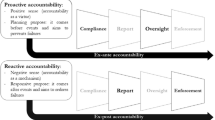Abstract
Since the introduction of the imitation game by Turing in 1950 there has been much debate as to its validity in ascertaining machine intelligence. We wish herein to consider a different issue altogether: granted that a computing machine passes the Turing Test, thereby earning the label of ``Turing Chatterbox'', would it then be of any use (to us humans)? From the examination of scenarios, we conclude that when machines begin to participate in social transactions, unresolved issues of trust and responsibility may well overshadow any raw reasoning ability they possess.
Similar content being viewed by others
References
Edmonds, B. (2000), 'The constructibility of artificial intelligence (as defined by the Turing test)'. Journal of Logic, Language and Information 9(4), pp. 419–424.
French, R.M. (1990), 'Subcognition and the limits of the Turing test', Mind 99, pp. 53–65.
Horn, R.E. (ed.) (1998), Mapping Great Debates: Can Computers Think?, Bainbridge Island, Washington: MacroVU Press. (A “road map” of the machine intelligence debate: seven posters, 800 argument summaries, 500 references; see www.macrovu.com.).
Krol, M. (1999), 'Have we witnessed a real-life Turing test?' IEEE Computer 32(3), pp. 27–30.
Rapaport, W.J. (2000), 'How to pass a Turing test', Journal of Logic, Language and Information 9(4), pp. 467–490.
Ronald, E.M.A. and Sipper, M. (1999), 'Why must computers make us feel blue, see red, turn white, and black out?' IEEE Spectrum 36(9), pp. 28–31.
Ronald, E.M.A. and Sipper, M. (2000a), 'The challenge of tamperproof internet computing'. IEEE Computer 33(9), pp. 98–99.
Ronald, E.M.A. and Sipper, M. (2000b), 'What use is a Turing chatterbox?' Communications of the ACM 43(10), pp. 21–23.
Turing, A.M. (1950), 'Computing machinery and intelligence', Mind 59(236), pp. 433–460.
Author information
Authors and Affiliations
Rights and permissions
About this article
Cite this article
Ronald, E.M., Sipper, M. Intelligence is not Enough: On the Socialization of Talking Machines. Minds and Machines 11, 567–576 (2001). https://doi.org/10.1023/A:1011876818541
Issue Date:
DOI: https://doi.org/10.1023/A:1011876818541



